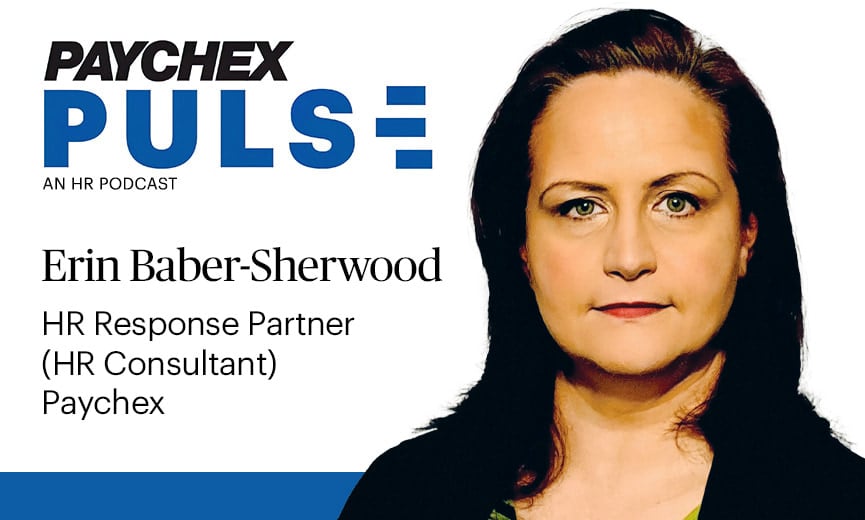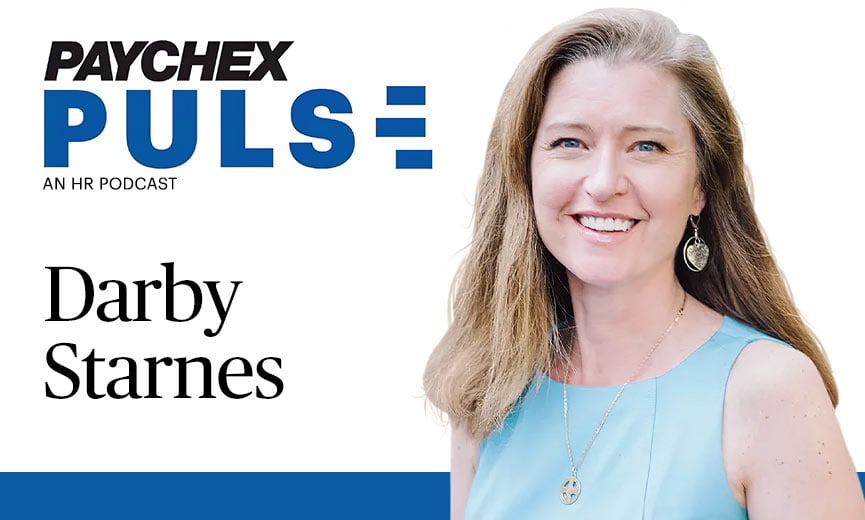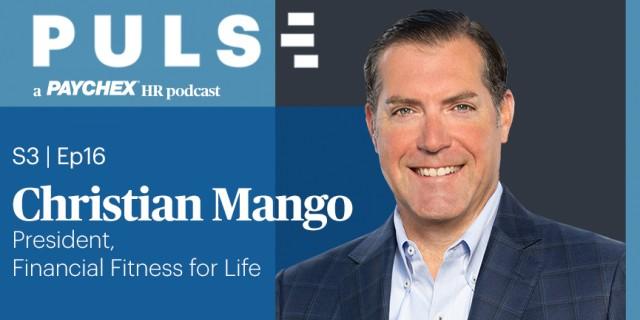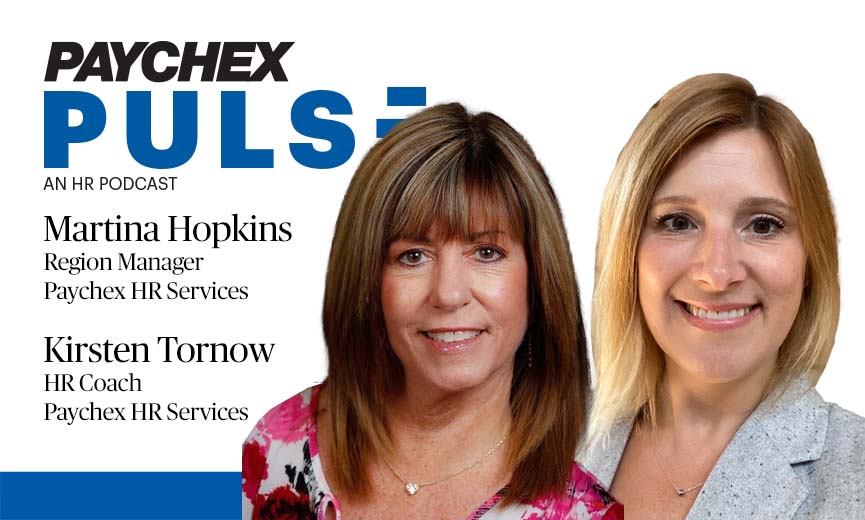Navigating the Talent Shortage: Creative Strategies for HR Professionals
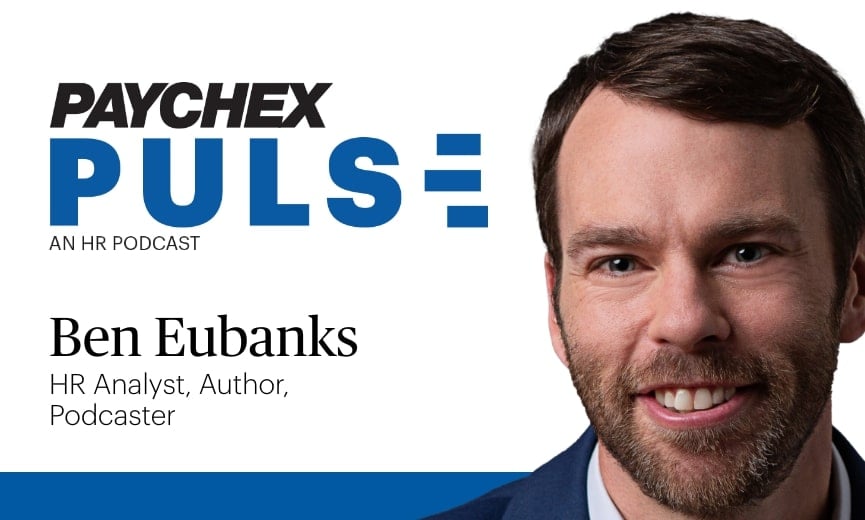
Podcast •

Watch
Summary
On this episode of Paychex PULSE, we dive into the data behind the talent shortage and offer up creative strategies to help overcome it with Ben Eubanks, the author of Talent Scarcity: How to Hire and Retain a Shrinking Workforce. From targeting unique talent pools to partnering with organizations like AARP to using tools like AI, he shares unique ways to approach hiring and retention to address changing workforce demographics.
Topics include:
00:00 – Welcome Ben Eubanks
01:15 – The talent scarcity trend
03:40 – Real world examples of creative hiring strategies
06:18 – How flexibility can retain and engage employees
08:15 – Using automation to retain employees
10:26 – Utilizing AI to help HR pros save time
13:08 – The importance of connection between employees and management
15:14 – Wrap Up
Looking to boost retention? Try a stay interview.
Watch our webinar on bridging the generational gap in the workplace to learn how to leverage the strengths of each generation and better compete for talent.
Retain your top talent by implementing an effective employee engagement strategy. Learn how.
See how our unique combination of HR tech and service and can help you overcome your hiring challenges, here.
View Transcript
Ben Eubanks (00:00)
When we ask employees, "Does your manager support you? Are you likely to stay at your job?" What we find is those people who say, "My manager doesn't even care," are just as likely as those that say, "My manager tries but they're just too busy." They're almost exactly the same likelihood to quit their job as versus someone who says, "My manager supports me, they're all in this with me." So, for anyone out there trying to figure out a big takeaway, like, we've got to get our managers shaped up, ready to support this because this is coming, and if we don't have them alongside us, we're going to be fighting a losing battle.
Rob Parsons (00:34)
Welcome to season four of Paychex PULSE, an HR podcast where HR professionals can find great insights on today's top issues and be inspired to build and lead effective teams in a healthier workplace.
Rob Parsons (00:48)
Hi everyone. Welcome to Paychex PULSE. I'm Rob Parsons. Joining me today is Ben Eubanks, Chief Research Officer of Lighthouse Research and Advisory. And we've got Ben on today because we're going discuss his new book, Talent Scarcity: How to Hire and Retain a Shrinking Workforce. Ben, welcome back to the podcast.
Ben Eubanks (01:11)
So glad to be here with you, Rob. Looking forward to a fun conversation as always.
Rob Parsons (01:15)
Yeah, and this is a great topic. It's definitely been super top of mind for, it seems a few years now, but what I really liked is how you opened up the book with like laying out the foundation, why this is a problem. I've not really seen before how well broken down like that it's been done.
Ben Eubanks (01:34)
Yeah, for me it was, it's helpful to take all of the big numbers, right, the big math, and make it very practical, very relevant, very easy to understand for the average person out there who may not be as much of a data nerd as I am, and probably you are a little bit too, Rob. And so for me it's really like, how do we take all the stuff we've been seeing, all the help wanted signs, all of us going to a restaurant like excited because it's half full and we find out we've got an hour wait, and all those kind of things, little signals we're seeing, and what the data are telling us is there are some big economic trends and big demographic trends that are driving this scarcity of talent overall, things like 10,000 baby boomers retiring or reaching termination every single day. The fact that our country is not, as the U.S. population has not had enough births for family to be at our replacement rate in over 50 years. So, lots of those big things like that are shifting, and you're like, wow, that's really a big trend. But now we're starting to see the impacts and the outcomes of that, and it's kind of painful for those employers out there tasked with, hey, go find somebody. You can't just assume that person's going to be there anymore.
Rob Parsons (02:40)
No, and what I really took from that too is that this isn't a passing fad. This is the labor market we're going to see, and I bet you anything, it's going to become more difficult.
Ben Eubanks (02:50)
Absolutely, for sure. So, the thing that's hard is right now people are like, "Well, I know someone who's out of work." And so, it's really easy to say, "Surely this can't be true, this can't be possible." All these big things. And the truth is the, right now, specifically at this point in time, the government's trying to slow things down, trying to check inflation, and they're intending to put people out of work. It's been stated there, but that is a very short-term thing. Long-term, all of these other things that I outlined and others that I cover in the book, things like millions of workers who are physically able and have worked in the past that are currently sitting on the sidelines. All of those kinds of things are still true. That doesn't change any of that even if this company's making a layoff or that company's slowing down their hiring right now in the moment. Long term, those trends are still going to carry out.
Rob Parsons (03:40)
So, let's dig into some of the solutions that you've recommended, some of the ways an HR professional can attack this challenge. And I want to start with the creative hiring strategies that you were laying out.
Ben Eubanks (03:52)
Man, I've had so much fun talking about these, Rob. I was actually talking to a group early this week here in Huntsville, Alabama where I'm based, and I was chatting with them about some of the things we're seeing in the data and I said, "What I'd really love is taking this and making it tangible." So I was telling them some stories and examples about companies that are really trying to solve for this. For example, some companies are saying, you know, "Instead of doing the one size fits all, let's try to just hire anybody. Let's target different populations that we want to try to bring in and create a higher concentration of these people in our organization." As an example of that, hey, let's target people who have a lot of experience. Let's target maybe older or more experienced workers. We've actually done some fun partnerships with AARP over the years because they represent that population and say, "Hey, these people are competent. They're quality workers, they have a lot of experience to bring to your organization. You should be considering them." And so some of the stories in the book I talk about are companies like EasyJet that say, "Hey, if you're one of those people who has been the responsible adult and you've worked, you know, this job you maybe didn't love very much just to get your kids through school and off to college and off on their own and now you're an empty nester, what are you going to do? Well, we've got an adventure for you. Come join us as an employee and come fly with us." And it's a really interesting campaign because they use their actual employees in these campaigns to talk about why they made that transition. So that's an example of that. One of the other ones that really sticks out to me are the companies that are saying, "We're going to hire someone that no one else is even going to think about." So Televerde, they're an Arizona-based outsourced call center operation, and if you pick up the phone right now and we were having to call one of their clients and a woman answered the phone, the chances are that woman is currently incarcerated. They actually go into a prison facility, they work with them to set up employment for women that want to work, and they set up facilities for them to operate out of. And they're allowing them to earn money, earn an income while they're paying back their debt to society. They're starting to save for their transition back to the workplace. And I can tell you for sure completely honestly, I never even once until I heard the Televerde story even considered hiring someone who might currently be incarcerated. But now I talk to employers about this story and they're like, "Wow, like that could actually work for the model of work we're doing, the kind of work, the kind of business we have." And so that kind of thing I love, because these are ideas that are far outside the norm for most employers. It's not just post another job board, but let's think about this in a very different kind of way.
Rob Parsons (06:05)
And I really like that element of creativity. Yeah, we're not just being more efficient, we're not just being more productive. There's some innovation and some creativity happening in that space.
Ben Eubanks (06:16)
For sure.
Rob Parsons (06:18)
Another area you touched on where that innovation comes into play, something I love is retention. I just love, it costs so much to get a new employee, costs so much to bring 'em up to speed. The current staff is being punished while you're getting these people up to speed. It just seems to me keeping your good people is the way to go. So, tell me a little bit about retention and what you saw there.
Ben Eubanks (06:41)
Yeah, so we can go in a hundred directions here on the retention side of it because I always say the easiest job to fill from a recruiting perspective, it's the one where we don't lose the person in the first place. If we can keep them, we don't have to re-recruit and fill that job all over again. A couple different themes in that. One of the big ones that stands out to me is this conversation around workplace flexibility. Now, for my friends out there who are business leaders, who are HR leaders who are listening to this thinking, "Oh yeah, flexibility, that means where you work, right? Working from home, working remotely." Actually, that's not the case. When you talk to the workforce, and we actually survey workers and ask them, "What does flexibility mean to you?" Where I work is number five on the list. The things at the very top of the list are when I work, so control over maybe shifts or schedules to fit around family responsibilities or other things they have going on. Things like having more choices in how I get my work done. Yes, I'm still responsible for the what, the requirements, the goals, the objectives, but give me a little bit of leeway or autonomy in how I get things accomplished. Those sorts of things are what flexibility's all about. And what we find is when employers really lean in and look at ways to deliver flexibility for their people, even if they're in one of those frontline roles, they have to be there in person, even for those organizations and those employees, that creates a really strong tie into retention and creates a place where those workers feel like their employer trust them, feel like their employer believes in them, and feel like their employer is empowering them to do their very best work. So not just sticking around, like you said Rob, but sticking around and then doing incredible work that we'd all like to celebrate.
Rob Parsons (08:11)
Love it, not just retained but retained and engaged.
Ben Eubanks (08:14)
Yes.
Rob Parsons (08:15)
So now you can bring us home by talking about automation, which I also thought was a great area, because we know there's turnover and we know there's things that happen, and I've got to get over the hump as it were. I've got to run lean sometimes, and you had a great chapter on automation and how HR leaders can help make that happen, help streamline that process.
Ben Eubanks (08:37)
Yes, absolutely. So, when I talk about automation, I talk about, it's kind of in the meta sense of how do we automate within the HR function, how do we get smarter about that? How are we using the tools that help us to not have to do all the heavy lifting ourselves, but I also talk about this from a work design perspective, because when something changes and they look over at HR like, "Hey, what you gonna do about this?" Like we somehow always get pinned with, "Hey, there's a thorny challenge here, can you solve it for us?" And we see in the research around the world, different organizations have been looking at this for years and they find that there's kind of a continuum there for things that are likely to be automated. So, if any of you're listening in and thinking, "Okay, what does this mean for our company?" If you have tasks in your organization that are very routine, very process focused, that are repetitive, those are great candidates for automation because there's not a real human element to it, there's not really a cost to that to be taking a human out of it because there's not much involvement in it in the first place. I think back to my own work, like having to reconcile benefit statements with payroll and things, like that was want to pull your hair out awful kinds of work, and thank goodness you can automate those kind of things today. But on the other side of that spectrum are things that are very human oriented, human focused, and things that are unpredictable. Well, guess what? There's lots of work out there, when it's unpredictable, we require a human to do that. The people who were the smartest scientists that are building and developing AI tools, they know that these tools are built for very narrow focus, narrow purposes. They can't do broad tasks; they can't replace a lot of the human ingenuity that comes into play there. And so I really like talking this automation thing not as a fear-based, not as a we should all be scared but as a, hey, there's an opportunity here to hand off some of those things that most of us don't enjoy that much anyway and really focus on the parts of our work that bring out the best creativity, bring out our best energy, and allow us to be who we really want to be when it comes to work.
Rob Parsons (10:26)
And I'm glad you brought up AI, Ben. I'd be remiss if I didn't mention that in 2018 you wrote a book, Artificial Intelligence in HR. I feel like you were a little ahead of the curve on that one. It feels like it's finally starting to become real.
Ben Eubanks (10:40)
I will tell you the truth, Rob. In the last two years, I've spoken on that topic a couple of times. In the last six months, I've spoken on it for audiences both in the U.S. and globally more than the last two years put together. The conversation around generative AI isn't just one that's hype and hype and, you know, all the flash and everything else. The thing that excites me about it is, for a lot of employers, AI tools were made for those that are at the very largest sizes, the ones that have the most employees because they have a lot of data, they have a lot of activities and a lot of volumes, so the AI tools make more sense. If you're a smaller employer though like many of those of you listening in right now, that was kind of out of your reach. It didn't apply as much. The generative AI conversation has unlocked that completely because it's putting power back into the hands of HR leaders. I've been doing a talk lately on how that can help us to unlock, you know, 5, 10, 20 hours a week of our time to be more focused on those things, as I said a minute ago, that really we get excited about, that bring out our best work because we're able to hand off, we're able to create, we're able to automate some other stuff that we have to do. That to-do list is always longer than we have the time to do it. And this allows us to check some things off that list that may not be like critical that our hands are on, but it needs our overview, our input. But we don't have to create everything from scratch. And so that's what's really thrilling to me, seeing some of that conversation shift, seeing this now into the hands of any HR leader out there that says, "I wanna be a little smarter, a little faster, a little better at my job." They now have the chance to do that because AI's enabling it for them.
Rob Parsons (12:09)
I love it, I love that point about accessibility, you know, it's available now. It's something I can use now.
Ben Eubanks (12:16)
Yes, absolutely. Again, like I said, it was kind of out of reach before, and now anyone, there are free tools out there. Anyone can try it; anyone can test it. We've been actually developing some prompts for those of you that are new to the conversation around generative AI, but prompts are basically how you ask a question, and we're teaching HR leaders how to ask those questions in a way to get answers quickly. I went through an example the other day with a group and said, "Okay, in five minutes or less, we're going to create an outline for a leadership development program. We're going to create a feedback survey to get input from leaders on this. We're going to create a handout for managers as a takeaway for this." And went through and created a dozen different resources in less than five minutes just to show them how possible it is. And it's so much fun for me. My wife was a teacher. I have to imagine her experiences were the same where you see their eyes kind of light up when you see how they realize how this could change some of the work they're doing day to day.
Rob Parsons (13:07)
So exciting. So, I want to bring us home, bring us back to talent scarcity. Any lasting thoughts to share with our listeners? I know it's going to be hard to choose just one. I can keep you to three if you'd like.
Ben Eubanks (13:18)
All right, the 27 takeaways on talent scarcity. That's what I heard you say, Rob, so. I'll say number one, as I said at the beginning today, regardless of what the news headlines are saying right this moment, overall, this scarcity thing is happening. Whether we want to admit it, whether we like it or not, it is happening. But I'm not a fan of just being doom clouds, like there's bad things coming. I want every leader out there to say, "I want our company to be at the forefront of this. I want to be thinking about creative ways to hire, thinking about creative ways to keep our very best people because it's going to become more competitive." Not only that, but I'm seeing the importance to focus on real relationships. There's a crisis of connection going on right now in the workforce, and people are saying, "I just wish my employer, I wish my leader would connect with me." And those companies that are not doing that are not hiring as well. They're not keeping their best people either because they're looking, they're seeking that on an active basis. One of the big things, the stats, I'll share the stat and close with this. One of the big stats from our brand-new study on performance and engagement and culture, looking at how the workforce feels about their employers right now. One of the things that we found that shocked me a little bit is that any sort of goodwill or grace that employees were giving their managers, their leaders in the last couple of years because chaos in the workplace, that's gone. When we ask employees, "Do your manager support you," and "Are you likely to stay at your job?" What we find is those people who say, "My manager doesn't even care," are just as likely as those that say, "My manager tries, but they're just too busy." They're almost exactly the same likelihood to quit their job as versus someone who says, "My manager supports me, they're all in this with me." So, for anyone out there trying to figure out a big takeaway, like we've got to get our managers shaped up, ready to support this because this is coming, and if we don't have them alongside us, we're going to be fighting a losing battle.
Rob Parsons (15:07)
Oh, that's fantastic, Ben. And we saw some of the same things in our Pulse of HR research, so it is, you're definitely on point with that. Thank you so much again for joining the podcast. It's always so great to have you.
Ben Eubanks (15:18)
I always appreciate it, Rob, thank you so much.
Rob Parsons (15:21)
And if anybody was interested in Talent Scarcity, I found it on Amazon.com, but I'm sure you can find it anywhere smart, great books are sold. Thank you again to our listeners, really appreciate having you here today. And as always, please stay happy and healthy. Be sure to subscribe to this and our Paychex Thrive business podcast on your favorite podcast platform. Looking for more ways to keep your finger on the pulse of industry dynamics? Visit our resource center for the latest research, thought leadership, and news at Paychex.com/worx, that's W-O-R-X. Thanks again for joining us. Until next time, please stay happy and healthy.
Announcer (16:05)
This podcast is property of Paychex, Incorporated 2023. All rights reserved.

 Apple Podcast
Apple Podcast Spotify
Spotify iHeartRadio
iHeartRadio
